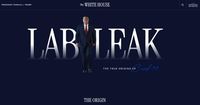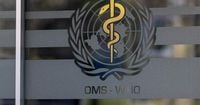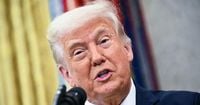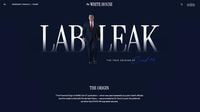In a significant shift, the Trump administration has replaced the federal government’s primary COVID-19 information portal with a new website promoting the controversial theory that the virus originated from a laboratory leak in Wuhan, China. As of April 18, 2025, visitors to Covid.gov and its sister site, Covidtests.gov, are redirected to a page titled "Lab Leak. The True Origins of COVID-19," which asserts that the SARS-CoV-2 virus escaped from the Wuhan Institute of Virology.
This new website marks a departure from the previous utility of Covid.gov, which provided essential information about COVID vaccines, treatment options, testing resources, and long COVID. The former sites helped connect individuals with pharmacies and community health centers for testing and medical visits. Now, the Trump administration's website features bold graphics, including an image of President Trump alongside the lab leak narrative.
According to White House spokesman Kaelan Dorr, the administration aims for transparency, stating, "The Trump administration has been very clear that, in contrast to the previous administration, we WILL be the most transparent administration in U.S. history. Nothing will stop us from innovating and finding creative ways to uphold our end of the bargain." This statement reflects a broader strategy to reshape public discourse around the pandemic's origins.
The content of the new website is largely informed by a December report from the Republican-led Select Subcommittee on the Coronavirus Pandemic, which concluded that COVID-19 likely emerged due to a laboratory or research-related accident. This subcommittee has been investigating the virus's origins since its formation in 2020, initially focusing on the Trump administration's pandemic response. However, the focus shifted to the lab leak theory after Republicans regained control of the House in early 2023.
In contrast, House Democrats released their own report in December, criticizing the subcommittee for failing to determine the virus's origins and asserting that the virus likely spilled over from animals to humans, a scenario consistent with historical patterns of pandemic emergence. They acknowledged the possibility of a lab leak but emphasized that the natural spillover theory is more plausible.
Both the Republicans' report and the new website allege that Dr. Anthony Fauci, the former director of the National Institute of Allergy and Infectious Diseases, played a role in suppressing the lab leak theory. However, Democrats have denounced these claims as false and accused the Republicans of launching "baseless attacks" on Fauci and other public health officials. Fauci, who voluntarily testified before the subcommittee in 2022, has consistently denied withholding information regarding the virus's origins.
Despite the claims made on the new website, many independent scientists argue that the lab leak theory is less likely than the natural spillover hypothesis. A survey conducted by the Global Catastrophic Risk Institute in 2023 found that the consensus among 168 scientists leaned towards natural emergence. Additionally, a 2023 editorial published in the New England Journal of Medicine stated that "of the three possibilities — natural, accidental, or deliberate — the most scientific evidence yet identified supports natural emergence" of the virus.
In January, a declassified report from the Office of the Director of National Intelligence acknowledged that both the lab leak and animal origin theories are plausible. However, the CIA later indicated that it believed the lab leak scenario was more likely, albeit with "low confidence" in that assessment.
The launch of the new website comes on the heels of significant funding cuts to pandemic-related initiatives. Less than a month prior, the Centers for Disease Control and Prevention (CDC) announced a reduction of $11.4 billion in COVID funding, which had previously supported state health departments in strengthening public health infrastructure. The National Institutes of Health also terminated various grants for COVID research, including a $577 million program aimed at developing oral drugs to combat potential pandemic pathogens. The administration justified these cuts by declaring that "the pandemic is over."
Critics of the new website have voiced concerns over its political motivations. Jamie Metzl, a critic of the wildlife spillover theory, expressed mixed feelings about the site, stating, "As someone who has pushed for a full accounting for COVID-19 origins since early 2020, I welcome all efforts to dig deeper. But it would be a terrible shame if such efforts distracted from essential work to help prevent further infections and treat people suffering from COVID-19 and long COVID."
Virologist Angela Rasmussen from the University of Saskatchewan pointed out that the five pieces of evidence presented on the website to support the lab leak hypothesis are either factually incorrect or misleading. She emphasized that the document appears to serve as propaganda rather than a genuine inquiry into the pandemic's origins. Similarly, Michael Worobey, an evolutionary biologist at the University of Arizona, argued that the evidence overwhelmingly supports the theory that the virus emerged from an illegal wildlife market in Wuhan rather than a laboratory leak.
As the Trump administration continues to assert the lab leak theory as "confirmable truth," the website also criticizes the World Health Organization's handling of the pandemic and former New York Governor Andrew Cuomo's controversial decisions regarding nursing homes. This shift in narrative reflects a broader trend of politicizing public health responses and the origins of the pandemic.
While the website aims to present a unified front on the lab leak theory, it faces significant backlash from the scientific community and public health experts who argue that the evidence does not support its claims. The ongoing debate over COVID-19's origins continues to reveal deep divisions in public opinion, with many Americans still grappling with the consequences of the pandemic.







